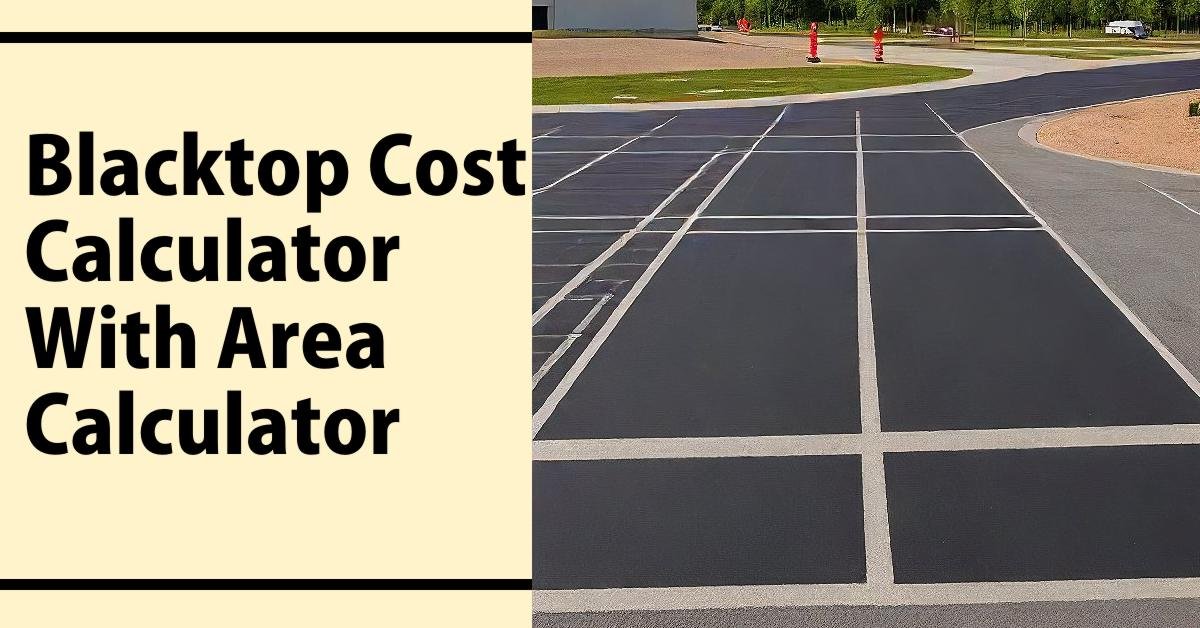Blacktop Cost Calculator
Enhancing your blacktop cost estimation process with a comprehensive calculator can significantly improve your project planning. Our Blacktop Cost Calculator integrates area calculation, depth consideration, and current pricing to provide you with accurate, reliable estimates.
Key Features of Our Blacktop Cost Calculator:
- Area Calculator: Easily input your project dimensions for precise square footage calculation.
- Depth Consideration: Customize the asphalt thickness based on your specific needs, ensuring optimal performance and longevity.
- Up-to-date Pricing: Our calculator uses current market rates to provide the most accurate cost estimates.
Factors Influencing Your Blacktop Costs:
Our calculator takes into account various factors that affect asphalt paving prices:
- Project Size: Benefit from potential economies of scale for larger areas.
- Material Quality: Choose from different grades of asphalt to balance cost and durability.
- Depth Options: Select the ideal thickness for your specific application.
- Regional Adjustments: Our calculator factors in location-specific costs for materials and labor.
Blacktop vs. Asphalt: Understanding Your Options
While our calculator focuses on blacktop, it’s worth noting that blacktop and asphalt are often used interchangeably. However, subtle differences may influence your choice:
- Blacktop typically contains more stone aggregate, potentially affecting the overall cost and appearance.
- The composition may impact durability and maintenance requirements, factors our calculator helps you consider in long-term cost projections.
For Gravel Yardage Area Calculation You can use the tool below.
https://calculatorasphalt.com/gravel-yardage-calculator-cubic-yards-calculator-from-tonnage/
Factors Affecting Asphalt Paving Prices
Understanding the factors that influence asphalt paving prices empowers you to make informed decisions and optimize your project costs. Key factors include:
- Project size: Larger projects often benefit from economies of scale, potentially reducing per-unit costs.
- Asphalt quality: Higher-grade materials may cost more initially but can offer superior longevity and performance.
- Site accessibility: Easy access to the paving area can reduce labor and equipment costs.
- Subgrade condition: A well-prepared subgrade can minimize additional preparation work and associated costs.
- Geographic location: Regional variations in material and labor costs can impact overall pricing.
- Seasonal timing: Paving during peak seasons may incur higher costs due to increased demand.
- Design complexity: Intricate patterns or multiple elevations can increase labor and time requirements.
By considering these factors, you can effectively plan your asphalt paving project, potentially identifying areas for cost optimization while ensuring high-quality results.
Blacktop vs asphalt cost comparison
Comparing blacktop and asphalt costs reveals subtle differences, despite their interchangeable use in the paving industry. Let’s explore these nuances:
Material composition stands out as a key differentiator. With its higher stone aggregate content, blacktop can influence overall expenses, typically adding $0.05 to $0.10 per square foot to the project cost.
Installation techniques vary between the two materials. Blacktop’s higher laying temperature often necessitates specialized equipment, potentially increasing labor costs by 5-10% compared to standard asphalt application.
Durability factors into long-term cost-effectiveness. The enhanced wear resistance of the blacktop, thanks to its composition, might extend its lifespan by 1-2 years over standard asphalt in certain applications.
Ongoing maintenance should be factored into your decision. Interestingly, the blacktop’s unique composition may reduce the frequency of sealing, offering potential savings of $0.10 to $0.20 per square foot over a decade.
Climate plays a crucial role in material performance. Blacktop’s resilience in extreme heat, due to its higher aggregate content, can prove advantageous in warmer regions, potentially extending pavement life by 10-15% under suitable conditions.
Aesthetics, while not directly impacting cost, may influence choice. Blacktop’s richer, darker hue often appeals to those seeking a specific look for their paved surfaces.
Setting time differences can affect project timelines. Blacktop’s quicker initial set might allow for earlier use, a potential advantage in time-sensitive projects that could indirectly impact overall costs.
Recyclability is another consideration. While both materials are recyclable, the blacktop’s higher aggregate content may slightly alter its recycling process, though the cost difference is usually negligible except in large-scale projects.
https://calculatorasphalt.com/asphalt-estimate-calculating-asphalt-tonnage/
